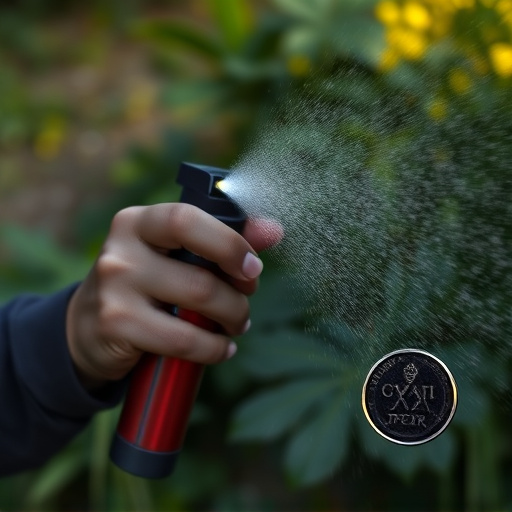Understanding Pepper Spray Laws by State is crucial for responsible ownership and safe self-defense practices. Federal law doesn't regulate pepper spray directly, but state laws govern permit requirements, usage restrictions, and penalties. Some states allow open carry without a permit, while others mandate permits or licenses. Staying informed ensures compliance, personal security, and prevents legal issues when using pepper spray.
Personal security is a top concern in today’s world, prompting many individuals to seek effective self-defense tools. One popular choice is pepper spray, a powerful yet legal defense mechanism that can deter potential attackers. This article explores the multifaceted aspect of personal security, focusing on pepper spray as a viable option. We’ll delve into understanding its effects, navigating the legal framework behind it, choosing the right type for your needs, and learning about safe usage practices. Discover how to stay protected by knowing Pepper Spray Laws by State.
- Understanding Pepper Spray: A Personal Security Tool
- Legal Framework: Pepper Spray Laws Across States
- Choosing the Right Pepper Spray for Your Needs
- Effective Use and Safety Considerations
Understanding Pepper Spray: A Personal Security Tool
Pepper spray, also known as oleoresin capsicum (OC) spray, is a popular personal security tool designed to disable attackers temporarily. It works by irritating the eyes and respiratory system, causing the target to experience temporary blindness, coughing, and difficulty breathing. This non-lethal weapon offers individuals a crucial layer of protection in potentially dangerous situations.
Understanding Pepper Spray Laws by State is essential for responsible ownership and use. Each state in the US has specific regulations governing pepper spray possession, purchase, and usage. These laws vary widely, affecting how individuals can carry and deploy pepper spray to protect themselves. Staying informed about these regulations ensures compliance and promotes safe, legal self-defense practices.
Legal Framework: Pepper Spray Laws Across States
The legal framework surrounding pepper spray, or oleoresin capsicum (OC) spray, varies significantly across different states in the US. While federal law does not specifically regulate the sale and possession of pepper spray, individual state laws vary widely in terms of permit requirements, restrictions on usage, and penalties for unauthorized possession.
Understanding Pepper Spray Laws by State is crucial for individuals looking to protect themselves. Some states, like Texas and Florida, allow citizens to carry pepper spray without a permit, while others, such as New York and California, require permits or licenses. Additionally, many states have specific restrictions on the type and amount of OC spray that can be possessed, as well as where it can be carried (e.g., in a vehicle or public spaces). Knowing and adhering to these Pepper Spray Laws by State is essential for ensuring personal security and avoiding legal repercussions.
Choosing the Right Pepper Spray for Your Needs
When selecting a pepper spray for personal security, understanding your specific needs and local regulations is paramount. Different pepper sprays have varying levels of capsaicin concentration, which determines their effectiveness and the range they can reach. For instance, if you’re looking to deter an attacker in close quarters, a higher concentration spray with a shorter range might be suitable. Conversely, for self-defense against potential threats from a distance, opt for a lower concentration formula that extends further.
Moreover, Pepper Spray Laws by State vary widely, so it’s crucial to research and comply with your area’s regulations. Check local laws regarding the type of spray allowed, its capacity, and any restrictions on carrying or possessing pepper spray. Understanding these legal aspects ensures you stay within the boundaries of the law while prioritizing your personal safety.
Effective Use and Safety Considerations
When using personal security inflammatory defense products, such as pepper spray, it’s crucial to understand both their effectiveness and safety considerations. These devices can be powerful tools for self-defense, but their proper use is essential to ensure maximum efficacy and minimal risk. Familiarizing yourself with local Pepper Spray Laws by State is the first step; compliance varies widely, so users must know and respect these regulations to avoid legal repercussions.
Safety measures include knowing how to deploy the spray accurately, understanding its range and duration, and practicing usage in safe, controlled environments. It’s also vital to store the product securely, out of reach of children or unauthorized individuals, and to regularly check expiration dates. Always keep a clear head when using such devices, as panic can lead to misapplication. Remember, proper training and awareness are key to making sure these tools serve their purpose without causing unintended harm.
In conclusion, pepper spray stands as a powerful personal security inflammatory defense product, offering individuals an effective means of deterring potential threats. Understanding its legal framework within Pepper Spray Laws by State is paramount for responsible ownership and usage. By choosing the right spray tailored to individual needs and adhering to safety guidelines, one can maximize its defensive capabilities while ensuring safe and lawful employment.
